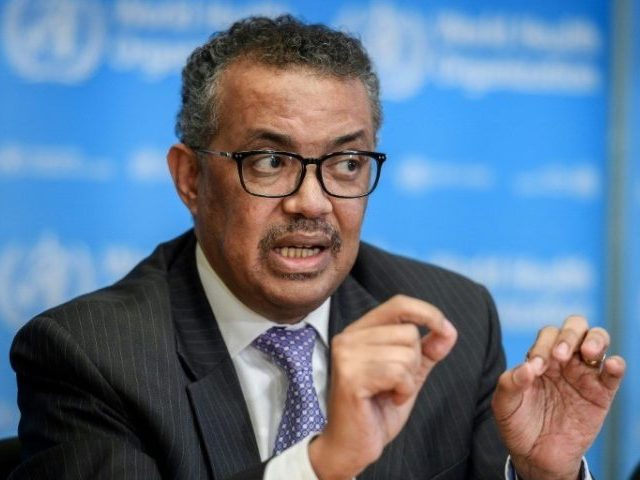World Health Organization (W.H.O.) Director-General Tedros Adhanom Ghebreyesus told a meeting of his agency’s governing body, the World Health Assembly (W.H.A.), on Monday that the coronavirus pandemic should teach the nations of the world “humility.”
“For all the economic, military, and technological might of nations, we have been humbled by this very small microbe. If this virus is teaching us anything, it’s humility,” Tedros told the W.H.A., held by teleconference this year due to the pandemic.
“Six months ago, it would have been inconceivable to most that the world’s biggest cities would fall eerily quiet; that shops, restaurants, schools, and workplaces would be closed; that global travel would grind to a standstill; that simply shaking hands could be life-threatening. Terms once used only by epidemiologists, like ‘reproduction number,’ ‘physical distancing,’ and ‘contact tracing’ have become common parlance,” he said.
The W.H.O. director said that countries “rich and poor, large and small” have “faced challenges in coming to grips with this virus,” but the challenges have been especially difficult for “low-income countries, small island developing states and those suffering from violence and conflict.”
“Nations have come together as never before, and geopolitical divisions have been thrown into sharp relief. We have seen what is possible with cooperation, and what we risk without it,” Tedros said, making his only indirect reference to the political battles fought by the Chinese Communist Party (CCP) to avoid a thorough international investigation into the origins of the virus.
Most of Tedros’s lengthy speech consisted of bromides and superficial observations — the pandemic is a tough challenge, people are scared, it’s amazing how much damage it has done to the world economy, everyone has difficult lessons to learn from this ordeal, and so forth — and he included the obligatory genuflection to climate change as the paramount issue that drives all of the world’s other problems, including viral pandemics.
A few passages were aimed at deflecting charges of malfeasance against himself and other top W.H.O. officials:
W.H.O. sounded the alarm early, and we sounded it often. We notified countries, issued guidance for health workers within 10 days, and declared a global health emergency — our highest level of alert — on the 30th of January. At the time, there were less than 100 cases and no deaths outside China.
We have provided technical guidance and strategic advice, based on the latest science and experience. We have supported countries to adapt and implement that guidance. We have shipped diagnostics, personal protective equipment, oxygen and other medical supplies to more than 120 countries. We have trained more than 2.6 million health workers, in 23 languages.
We have driven research and development, through the Solidarity Trial. We have called for equitable access to vaccines, diagnostics and therapeutics through the ACT Accelerator. We have informed, engaged and empowered people.
We have fought the infodemic, combating myths with reliable information. And we have called consistently for the two essential ingredients for conquering this virus: national unity and global solidarity.
Tedros insisted the W.H.O. is “committed to transparency, accountability, and continuous improvement,” and promised he would “initiate an independent evaluation at the earliest appropriate moment to review experience gained and lessons learned, and to make recommendations to improve national and global pandemic preparedness and response.”
The director claimed he has “made a priority of transforming W.H.O. into an organization that is agile and responsive, focused on outcomes and impact,” and listed various bureaucratic reforms he has implemented, giving the clear impression that more serious reforms are not on the table.
Tedros finished his address with a pitch for universal health coverage, whose importance he said was highlighted by the coronavirus pandemic:
COVID-19 is not just a global health emergency, it is a vivid demonstration of the fact that there is no health security without resilient health systems, or without addressing the social, economic, commercial and environmental determinants of health.
More than ever, the pandemic illustrates why investing in health must be at the centre of development. I will repeat this: More than ever, the pandemic illustrates why investing in health must be at the centre of development.
We’re learning the hard way that health is not a luxury; it’s a necessity. It is a necessity.
Health is not a reward for development; it is a prerequisite.
Health is not a cost; it’s an investment.
Health is a pathway to security, prosperity and peace.
“Now more than ever, we need a stronger W.H.O. There is no other way forward but together,” he concluded.

COMMENTS
Please let us know if you're having issues with commenting.